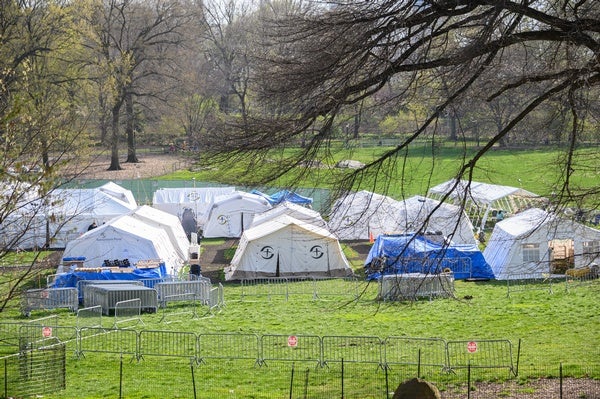
The coronavirus pandemic has made the importance of sustained, world-class medical research more obvious than ever. The current pandemic is a powerful wake-up call, harkening back to Mary Lasker’s warning: “If you think research is expensive, try disease.” Her words resonate powerfully as we observe the tragic loss of life and devastation of the global economy wrought by a “once-in-a-100-year” virus that experts had repeatedly forecasted (e.g., The Coming Plague, 1994.)
As clinicians on the front lines care for patients, public health experts implement community interventions, and policy makers move to expedite relief packages, we as a nation should grab the opportunity to learn lessons from this dire challenge. We now have the opportunity to gain insights about medical research that can guide us as we continue the battle against COVID-19 and that can help us prepare for future outbreaks. Here’s some of what the COVID-19 has taught us already:
Good science is key to finding real answers: The urgency of this pandemic has focused the world’s attention on discovering safe and effective vaccines and treatments. Touting unproven therapies brings false hope and can be dangerous. The recent death of a person who “self-medicated” with a chloroquine product he had heard about over the internet is a vivid example. The time-honored scientific protocols for generating data on a drug’s safety and efficacy using carefully conducted clinical trials, followed by thoughtful FDA review, are mainstays of “good science” and good clinical practice. They cannot be abandoned.
Funding for medical research must be sustained and predictable: Intermittent funding that is provided only when there is a public health emergency shortchanges our capacity for rapid response as new pathogens emerge. Research must be ongoing before, during and after a disease outbreak. “Stop-and- start” investigations disrupt research. A number of promising vaccines were in development during the SARS and MERS coronavirus outbreaks—but once infections waned, so did the research funding. Protovaccines that could have been useful in developing a rapid response to this novel virus were literally put on ice at the University of Texas and elsewhere—thus handicapping the current development process by many months. Sustained funding is necessary to support the full range of discovery—from elucidating the biology of the virus to developing drug candidates to creating improved” systems of care delivery.
Public health infrastructure is essential: The COVID-19 crisis has highlighted profound shortcomings in our current fragmented approaches to health. Chronic underfunding of public health departments, dismantling of national pandemic preparedness offices and the lack of surge capacity in hospitals have hampered our nation’s ability to respond rapidly and effectively. These are issues that need to be urgently addressed in the short term but are also realities that must be changed long-term. This is an opportunity to consider innovative approaches, including global partnerships with the World Health Organization and others, to detect, respond to and prevent outbreaks of disease when they emerge anywhere in the world.
Technological advances help: We have tools that were not available to us during previous pandemics. This is good news. Telehealth allows patients to access many aspects of ongoing health care without the risk of going to medical facilities and spreading disease to health care providers. New diagnostic machines are available that have been quickly adapted by industry to identify this virus. Teleconferencing facilitates rapid sharing of information among health professionals and others. As we increase use of these approaches during the pandemic, it will be important to integrate these innovations into routine practice.
Support of the workforce is critical: But technology is not a panacea. We must support the people who create and deliver these breakthroughs. The importance of developing a strong STEM workforce is made abundantly clear by COVID-19. We need to ensure funding for young scientists and reduce administrative overload of established researchers. The current failure to provide adequate PPE (personal protective equipment) to clinicians caring for coronavirus patients leaves health professionals feeling like “sacrificial lambs” and fails to recognize their altruistic service. Partisan infighting that slows support to clinicians and other first responders is unacceptable when the well-being of our workforce is at stake.
Investment in medical research is a public good: The COVID-19 crisis will cause immense human suffering and will continue to do so for some time. As we come together to battle the pandemic, we see clearly that investments in areas that improve human health are invaluable. Medical research provides critical solutions in this battle—we have the capacity and, increasingly, the urgent will to create vaccines, develop drug therapies, improve clinical care systems and strengthen public health capacity. We must remember that once this particular epidemic is over—and before the next arrives.
I am confident that medical science will provide key answers to the current pandemic. Humans will prevail against the virus. But will we learn from this hardship? Once the crisis abates, will our nation ensure serious investment in essential medical research so as to be able to respond to future biological threats? Will we successfully incorporate best public-health practices on display in other nations? My sincere hope is that Americans will step forward to demand that biomedical science be our priority for the safety and well-being of all.
"expensive" - Google News
April 30, 2020 at 06:00PM
https://ift.tt/2yU7m3e
If You Think Preparedness Is Expensive, the Pandemic Puts Things in Perspective - Scientific American
"expensive" - Google News
https://ift.tt/2GwwnlN
Shoes Man Tutorial
Pos News Update
Meme Update
Korean Entertainment News
Japan News Update
Bagikan Berita Ini














0 Response to "If You Think Preparedness Is Expensive, the Pandemic Puts Things in Perspective - Scientific American"
Post a Comment